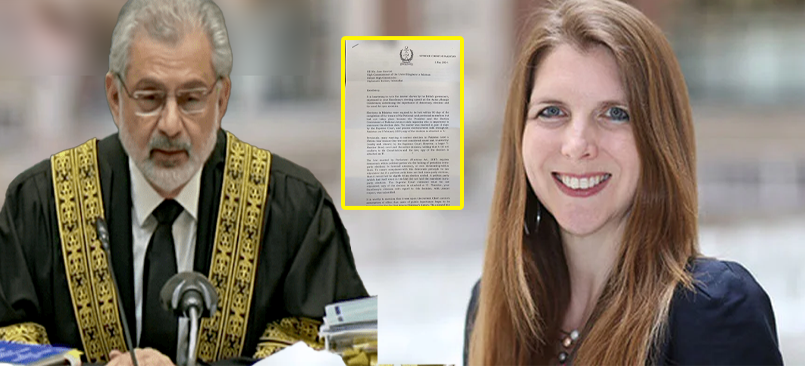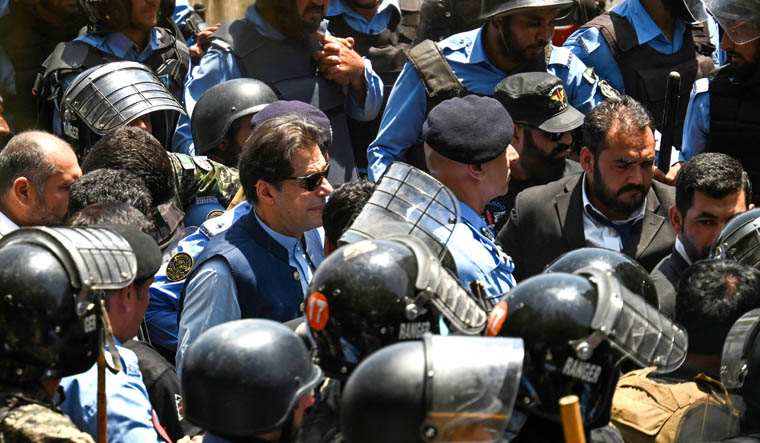Chief Justice of Pakistan (CJP) Qazi Faez Isa is once again at the center of a major controversy, defending the Supreme Court’s contentious January 13 ruling. This ruling declared the intra-party elections of the Pakistan Tehreek-e-Insaf (PTI) unlawful, which led to the party being stripped of its election symbol in the recent general elections. The ruling has sparked significant debate and criticism, with many questioning its implications and fairness.
The controversy began with the Supreme Court’s decision on January 13, authored by CJP Isa himself, which invalidated PTI’s intra-party elections. This decision significantly impacted the credibility of the February 8 general elections, as it prevented PTI from securing reserved seats and left victorious PTI candidates vulnerable to no repercussions under Article 63 A of the Constitution when they switched allegiances.
The controversy escalated further when British High Commissioner Jane Marriott made remarks at the Asma Jahangir Conference emphasizing the importance of democracy, elections, and open societies. In response, the Supreme Court Registrar, following CJP Isa’s directives, penned a letter on May 3 to Marriott defending the January 13 ruling.
The letter highlighted that, by law, elections in Pakistan must be held within 90 days of the completion of the National and provincial assemblies’ tenure. However, due to a disagreement between the President and the Election Commission of Pakistan (ECP) over who had the authority to announce the election date, this deadline was missed. The Supreme Court resolved this matter in just 12 days, leading to the general elections being held on February 8, 2024.
Despite the Supreme Court’s swift resolution, the fairness of the elections remains a contentious issue. Following the January 13 order, PTI’s legal team withdrew their contempt petition against another SC order directing the ECP to level the playing field for the party. However, whispers in the corridors suggest that PTI candidates faced significant challenges during their campaigns. Many PTI leaders were either imprisoned or in hiding, particularly following the incidents of May 9, which led to increased pressure on PTI leaders to defect to the Istehkam-e-Pakistan Party (IPP).
The judiciary, with CJP Isa at its helm, has faced criticism for its inability to secure the release of PTI’s female members from custody, who remain as under-trial prisoners. The Supreme Court also remained silent on the banning of PTI’s gatherings during the election campaign. Additionally, returning officers (ROs) were appointed from the civil administration, raising serious questions about their impartiality.
The letter from the SC Registrar also noted that many candidates faced lifetime bans in previous elections because they were not considered honest and trustworthy (‘sadiq’ and ‘ameen’) by the top court. However, a larger seven-member bench recently overruled this decision, deeming it non-compliant with the Constitution and the law. This verdict notably ended the lifetime disqualification of Mian Nawaz Sharif and Jahangir Khan Tareen.
The letter defending the January 13 order also drew historical parallels, referencing the overthrow of Iran’s elected government in 1953 and the establishment of Israel following the Balfour Declaration. The SC’s letter emphasized the importance of learning from past mistakes and advocating for equality, peace, and humanity.
The Supreme Court acknowledged its own past mistakes and highlighted steps taken to ensure they are not repeated. It noted that the current CJP has initiated live streaming of court proceedings for the first time in Pakistan’s history, allowing the public to view Supreme Court proceedings with transparency.
Commenting on the letter, advocate Abdul Moiz Jaferii described it as bizarre, noting that it is unusual for the SC Registrar to write to a diplomat on the CJP’s instructions to defend the Chief Justice’s own judgments. Jaferii also criticized the letter for attacking the historical position of the country represented by the diplomat, calling it an unprecedented move.
The debate continues over whether this letter will impact PTI’s pending review petition in the case. The implications of the January 13 ruling and the ongoing controversy surrounding it highlight the complex interplay between Pakistan’s judiciary, political landscape, and international relations.



